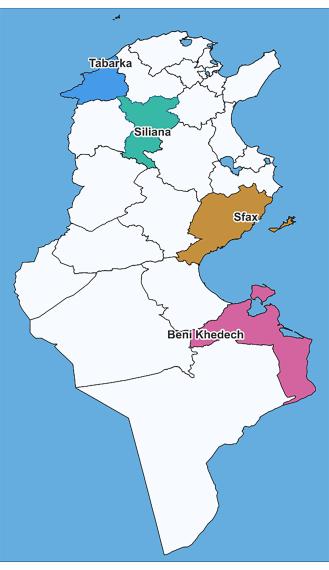A USIP Fact Sheet
Tunisia remains a key regional partner of the United States and NATO and plays an important role in the Mediterranean and the African continent, particularly in its immediate neighborhood where instability and security threats in Libya and the Sahel continue to proliferate. Domestically, it continues to navigate economic, political, environmental and security challenges. These challenges have caused widespread discontent with the state and led to changes in the political system, centralizing power in the executive branch and restructuring subnational governance. USIP works in close partnerships with the government and civil society to support tangible reforms that advance security, human dignity, responsive governance, economic opportunity and regional diplomacy.
USIP’s Work
USIP’s current efforts include a robust security sector governance partnership with the Tunisian Ministry of Interior, curriculum and training partnership with the International Diplomatic Academy of Tunis showcasing the American model of diplomacy, and local governance assistance that builds sustainable state capability using local expertise and resources — reducing dependence on foreign aid. The Institute also conducts research that informs future programs, analyzes ongoing efforts and helps develop new approaches to peacebuilding. From its offices in Tunis and Washington, D.C., USIP convenes thought leaders, government officials and international visitors.
Security Sector Reform: Advancing Professionalization, Efficiency and Excellence
The Institute supports the Tunisian government’s ongoing efforts in security sector reform. By collaborating closely with Tunisia’s key national security entities, USIP builds institutional capability to design and implement reforms that foster the development of a service-oriented force equipped with the tools to address evolving and complex security challenges with efficiency and integrity.
The Institute partners with the Ministry of Interior to reinforce operational capacities in planning, modernize training systems and strengthen field performance while providing strategic guidance to ensure alignment with international standards established by the United States. This approach further consolidates the security sector’s capabilities, building on shared standards to address common threats to national security.
Strengthening Regional Diplomacy: Supporting the International Diplomatic Academy of Tunis
In light of Tunisia’s ambition to play a larger role in regional diplomacy, the government issued a decree in 2019 to expand the Diplomatic Training Academy’s mandate and expand its training program to better prepare Tunisian and international diplomacy professionals with the skills to meet the evolving challenges facing their region and the world. With support from the U.S. Department of State’s Bureau of Near Eastern Affairs, USIP provides tailored technical support to the academy to achieve its new mandate, showcasing the American model of diplomacy as an effective counterweight to Chinese influence in the region. This project draws on USIP experts and leading American institutions to support curriculum development, strengthen institutional capability and advise the academy’s leadership in planning and research.
Local Solutions to Natural Resource Challenges
Challenges in natural resource management across the country have imperiled citizens’ livelihoods, health and well-being, creating deep-seeded grievances against the state. In marginalized communities, these pervasive issues have become significant drivers of internal displacement, social unrest and vulnerability to extremism. Building on its successes in multi-stakeholder problem-solving approaches in conflict-prone regions, USIP implements a pioneering and adaptive initiative which supports government, civil society and other relevant stakeholders to co-develop and implement solutions to core community grievances around access to and management of water and other critical natural resources. The project builds state capability to address these challenges with existing means instead of relying on expensive imported solutions that are out of alignment with local realities.
